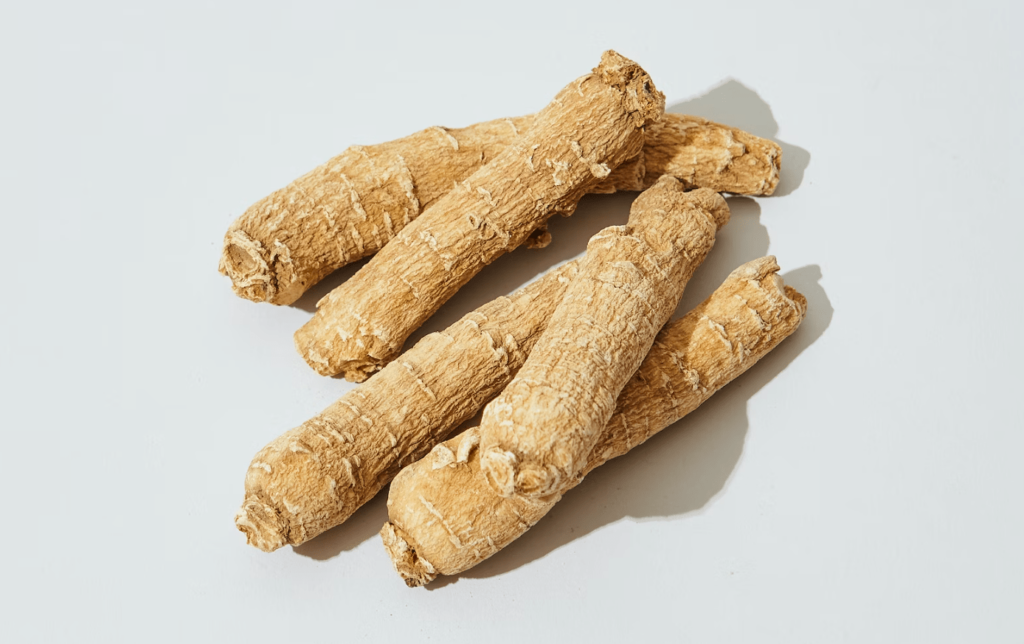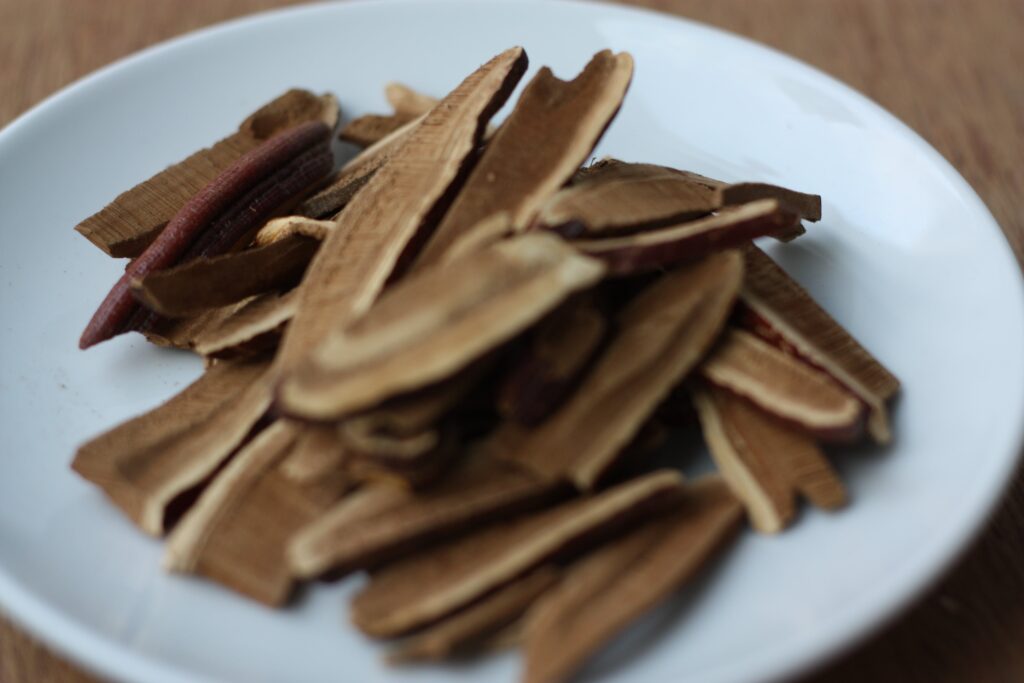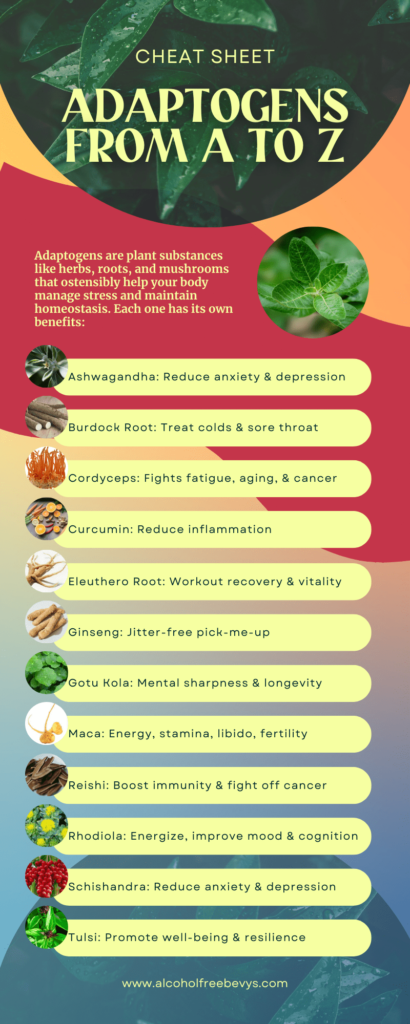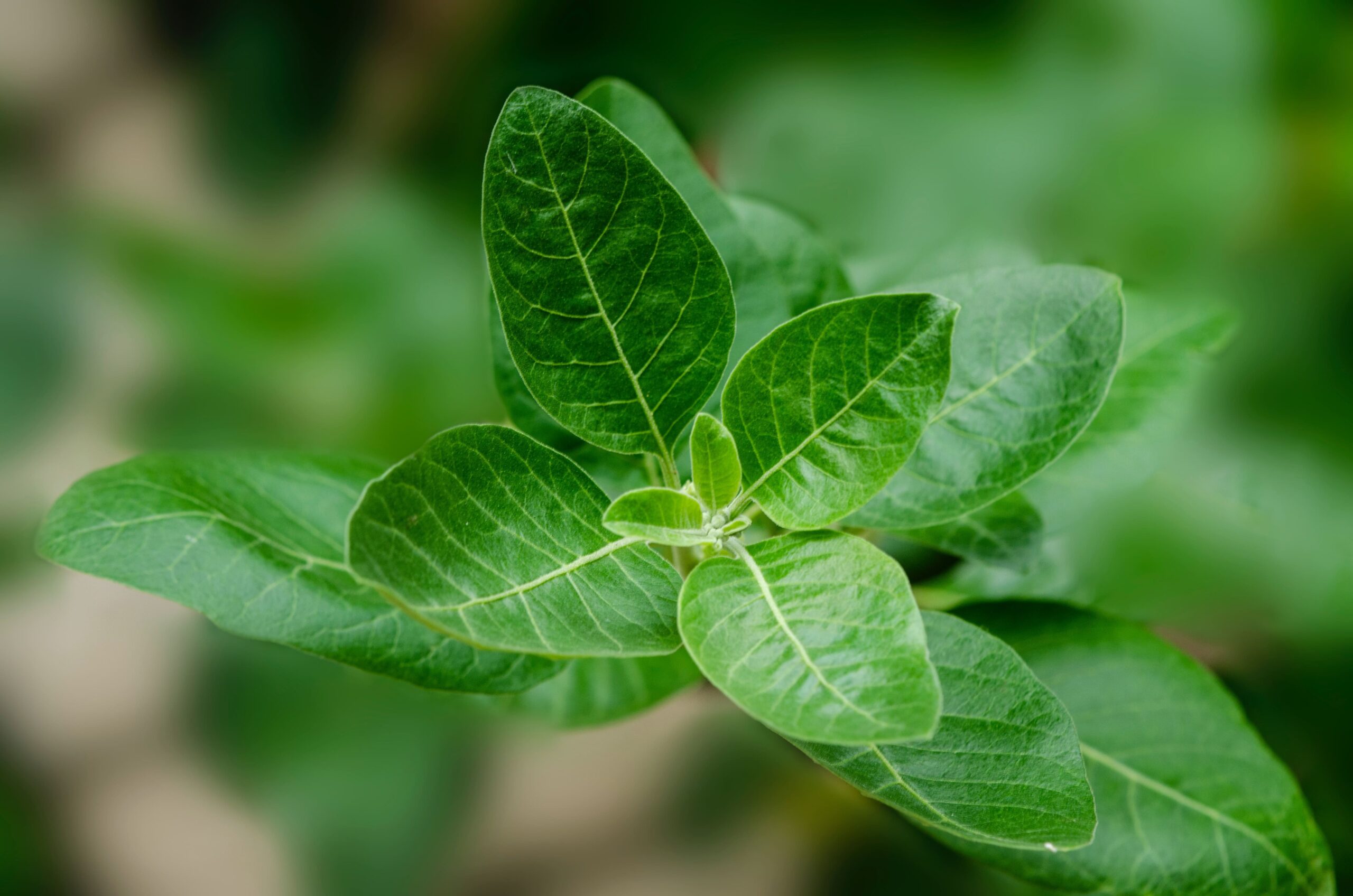Essential oils, breathwork, mindfulness—all of these centuries-old natural remedies and traditions from Eastern cultures have been going mainstream in the West. What’s the newest one trending faster than you can say “cold plunge”?
Adaptogens and adaptogenic drinks.
If you’ve been to your local Whole Foods lately, you’ve undoubtedly encountered swaths of adaptogen products, from sparkling functional beverages to supplement powders to gummies.
But what are adaptogens exactly, and why are they having a moment? Keep reading for everything you want to know about the top adaptogens, their role in the non-alcoholic beverage space, and how you can use them for your benefit.
Contents
What Are Adaptogens?

Adaptogens are plant substances like herbs, roots, and mushrooms that ostensibly help your body manage stress and maintain homeostasis. They are helpful because our bodies need to maintain balance—or stable conditions—for our overall health and survival.
Adaptogens are typically used in supplement capsules, teas, and tinctures—but you can consume them fresh in some cases.
While Western medicine and modern science still have a lot to research and explore regarding adaptogens, we know that humans have been using these herbs since at least 3,000 BCE.
They appear within India’s Ayurvedic tradition, Traditional Chinese Medicine (TCM), and all over the ancient world.
For example, the ancient Greeks documented 600 different plants and their uses, with many of them being adaptogenic.
Catching up with the East, in the 1960s in the US, Dr. Israel Brekhman earned the nickname “The Father of Adaptogens” after studying them for over 45 years.
What Makes a Plant an Adaptogen?
According to Dr. Brekhman, a plant has to meet all four of these criteria to be classified as an adaptogen:
- Is non-toxic and safe to use daily with no negative side effects when properly dosed
- Helps the body cope with stress
- Both one-time and prolonged use of the plant results in stimulating effects and broad benefits within the immune system
- Consuming it provides balance within the body and normalizes its functioning
The Science Behind Adaptogens
Adaptogens function at a molecular level by setting a stable balance in the HPA axis, a complex system of glands, hormones, and receptors in the human body. Having a healthy HPA axis is crucial to your body’s stress responses, energy metabolism, and homeostasis.
Unlike stimulants such as coffee, which always lift you up, or depressants like alcohol, that mellow you out, adaptogens work bi-directionally to help maintain a balance.
So, depending on the time of day, adaptogens will typically either decrease or increase the levels of your stress hormones and neurotransmitters. For example, if you take ashwagandha at night, if your cortisol levels are too high, it will lower them. Conversely, if you take ashwagandha in the morning, it can help raise cortisol levels, giving you a boost of alertness.
Here is a look at how adaptogens can help you respond better to stress:

There is also evidence that adaptogens may interface with the immune-neuro-endocrine system, which helps your body regulate its use of energy and sustain strong immune defenses.
A lot more research is needed to fully explore adaptogens and understand exactly how they work. Unfortunately, since they are natural and anyone can grow and sell adaptogens, there is less incentive for companies to fund this kind of research.
“Things in nature like basil and coriander can’t be patented, so there isn’t a lot of money thrown at them.”
– Mark Schatzker, The Dorito Effect
Get to Know 12 of the Best Adaptogens from A to Z
The good news is that we don’t have to understand exactly why an herbal remedy works to start using it, right?
Let’s look at a dozen of the most common adaptogens and how you can take advantage of their potential benefits, such as stress relief and mood enhancement.
1. Ashwagandha
One of the most commonly used adaptogens, ashwagandha’s scientific name is withania somnifera. It can also be referred to as Indian ginseng or winter cherry. Its root powder has been used for centuries in Ayurveda, or traditional Indian medicine, for reducing anxiety and depression.
One of the most calming of the adaptogens, its greatest strength is balancing mood and stress while nourishing and strengthening the nervous system. Practitioners of Ayurveda also consider it to be a “Rasayana,” which means that it helps maintain youth, both mentally and physically.
Potential Ashwagandha Health Benefits Include (Source):
- Relieve stress and anxiety
- Improve sleep
- Lower blood sugar and fat
- Improve sexual function in women
- Stronger focus and memory
- Support heart health by increasing VO2 Max levels
- Combat inflammation
- Improve focus on work or study
- Promote a sense of well-being
2. Burdock Root
Related to the artichoke, burdock, or arctium lappa, originally comes from Northern Asia and Europe. It’s packed with antioxidants, which boost your body’s ability to protect its cells from damage due to free radicals.
Free radicals are highly reactive molecules that can damage cells and biomolecules like DNA in a process called oxidative stress. Excessive oxidative stress can contribute to various health problems, including aging, inflammation, and chronic diseases like cancer and cardiovascular disease.
In the herbalism community, burdock is also thought to be an alterative, meaning it alters longstanding, chronic conditions.
Potential Burdock Root Health Benefits Include (Source):
- Anti-inflammatory properties
- Removing toxins from the blood
- Inhibiting some types of cancer
- Aphrodisiac properties
- Improving skin appearance & treating some conditions like acne or eczema
- Treating coughs, colds, gout, and hepatitis
- Aiding the body with detoxification
- Strengthening liver health
- Lowering cholesterol
3. Cordyceps
A mushroom that’s been used in Chinese and Tibetan medicine for centuries, cordyceps helps maintain stamina, endurance, and well-being. Cordyceps (meaning club-headed in Greek) is a general name for a genus of fungi that includes about 600 worldwide species.
Potential Health Benefits of Cordyceps Include (Source):
- Improving blood-fat levels
- Boosting exercise performance
- Anti-aging properties
- Combatting tumor growth
- Helping manage Type 2 diabetes
- Decreasing LDL cholesterol
- Reducing inflammation
4. Curcumin

A popular spice in India and Southeast Asian countries, curcumin is the polyphenol that gives turmeric its yellow color. Another name for it is diferuloylmethane. Of all the spices you can add to your food, turmeric is one of the most beneficial, with plenty of science to back it up.
Potential Health Benefits of Curcumin Include (Source):
- Helping manage inflammatory conditions
- Protecting the liver from several toxic compounds
- Relieving anxiety and muscle soreness
- Providing relief from dental pain
- Anti-cancer properties
- Supporting eye health
- Lowering cholesterol and triglyceride levels
You May Also Like
-
Top Non-Alcoholic Adaptogen Drinks for a Healthier Happy Hour
-
The Ultimate Guide to Alcohol Alternatives in 2023
-
My Dri/kit Review: Elegant Non-Alcoholic Cocktail Kits and Gift Sets
-
Non-Alcoholic Thanksgiving Drinks: What to Bring If You’re Not Drinking
-
Best Non-Alcoholic Beverages for a Wedding Reception: Delicious and Inclusive Options
5. Eleuthero Root aka Siberian Ginseng
Despite its name, Siberian Ginseng is completely different from American and Asian ginseng (Panax ginseng), with different active chemical components. Siberian ginseng is often described as having a milder and slightly sweeter taste, whereas Asian and American ginseng can have a more bitter or earthy taste.
The active ingredients are called eleutherosides, which may stimulate the immune system.
In Russia, Siberian ginseng has long been used to prevent colds and flu while increasing energy, longevity, and vitality.
Potential Health Benefits of Eleuthero Include (Source):
- Helping to recover in less time from acute stress and intense workouts
- Decreasing fatigue by increasing your work and exercise capacity
- Protecting against cognitive decline and reducing DNA damage
- Preventing heart disease
- Relieving anxiety and depression
- Recovering from burnout
6. Ginseng (American or Asian)

An ingredient you might find in Korean and Chinese cuisine, panax ginseng is a powerful adaptogenic herb that holds a prominent status in herbal medicine for its various therapeutic effects. When you’re looking for a pick-me-up, it can help you stay focused and motivated without the jitters. Traditionally, it was used in China to strengthen the “chi” in the elderly.
Potential Health Benefits of Ginseng Include (Source):
- Combatting fatigue
- Helping fight inflammation
- Improving erectile dysfunction
- Anti-cancer properties
- Boosting the immune system
- Benefiting brain function
- Lowering blood sugar
7. Gotu Kola
A member of the parsley family, gotu kola, or centella asiatica, supports mental sharpness. Nicknamed the “herb of longevity,” gotu kola has long been used in traditional Chinese, Indonesian, and Ayurvedic medicine.
Potential Health Benefits of Gotu Kola Include (Source):
- Boosting cognitive function
- Enhancing memory and nerve function, helpful in treating Alzheimer’s disease
- Helping promote better hair growth at the follicular level
- Reducing anxiety caused by lack of sleep
- Improving circulation and reduce swelling
- Promoting wound healing, minimize scarring, and fading stretch marks
- Treating arthritis and joint pain
8. Maca
Hailing from Peru, maca is a plant with a long history of traditional use to enhance energy, and stamina, as well as promote increased libido and fertility. It exhibits a distinctive appearance, resembling a hybrid of a turnip and a radish, with robust leaves reminiscent of rosemary. Various maca varieties can be found in an array of colors, including red, pink, black, and yellow.
Potential Health Benefits of Maca Include (Source):
- Enhancing energy and stamina
- Improving libido and sexual function
- Supporting fertility
- Balancinh hormones
- Mood Regulation and Stress Reduction
- Increasing Mental Clarity and Focus
- Enhancing Immune System Function
- Nutrient-rich source of vitamins and minerals
- Supporting bone health
9. Reishi

If adaptogens were a rock band, reishi, scientifically known as, Ganoderma lucidum, would be the frontman. Reishi is the ancient “mushroom of immortality,” revered for over 2,000 years by traditional Chinese healers. It’s commonly used to boost the immune system and fight cancer studied for its effectiveness in treating cancerous tumors.
Potential Health Benefits of Reishi Include (Source):
- Boosting the immune system with its beta-glucans component
- Increasing strength and stamina
- Fighting tumor growth
- Lowering cholesterol
- Treating lower urinary tract symptoms in males
10. Rhodiola
Rhodiola Rosea, also known as “Golden Root” and “Arctic Root,” is frequently found in cold, mountainous areas across Europe and Asia. Traditionally, inhabitants of northern Scandinavia and the Nordic regions have turned to Rhodiola for addressing anxiety, fatigue, and depression. Additionally, it has been utilized to enhance physical endurance and bolster resistance against altitude-related ailments.
According to Dr. Tieraona Low Dog, a leading national expert in the US on botanical medicine and integrative approaches to healthcare, it can be very energizing, but she says it can be overly stimulating for some.
Potential Health Benefits of Rhodiola Include (Source):
- Reducing fatigue, depression, and pain
- Reducing stress
- Improving memory and learning brain functions for enhanced mental performance
- Decreasing perceived exertion while exercising, leading to improved performance
- Helping manage diabetes
- Inhibiting the growth of cancer cells
11. Schisandra
Also referred to as “Omija,” this vibrant red berry is indigenous to China, where it has played a role in traditional medicine, tea, and wine production for centuries. It is used in TCM to stimulate the central nervous system, protect the liver, and lower chronic disease risk.
Potential Health Benefits of Schisandra Include (Source):
- Being rich in beneficial lignans that may contribute to a healthy gut microbiome
- Improving concentration, coordination, and endurance
- Anti-cancer effects
- Anti-aging potential
12. Tulsi (“Holy Basil”)
Considered a potent adaptogen, tulsi, also known as “holy basil” or Ocimum sanctum L., has a unique combination of pharmacological actions that promote well-being and resilience. Herbalists use it to increase focus, decrease anxiety, and boost the immune system.
Potential Health Benefits of Tulsi Include (Source):
- Protecting against infection and treating wounds
- Improving digestion
- Aiding in weight loss
- Fighting diabetes
- Protecting oral and dental health
- Preventing aging with antioxidants and minerals
- Enhancing immunity
Adaptogens: A Cheat Sheet

How to Incorporate Adaptogens Into Your Life
Adding adaptogens into your routine is easier than ever, thanks to a bevy of new, non-alcoholic adaptogenic drinks that you can consume any time of day. You can find adaptogenic sparkling waters, wine alternatives, hoppy drinks, elixirs, and more.
Some people are even ditching their morning coffee for a new adaptogenic drink called MUD\WTR (pronounced “mud water”). MUD\WTR is a coffee alternative consisting of 100% organic cacao, ayurvedic herbs, and functional mushrooms. They say they like the energy they get from it without the crash they would have from coffee.
I myself love a good latte with adaptogens, like the “Chagaccino” which contains Chaga mushrooms.
If the new wave of adaptogen products isn’t your thing, you can go the traditional route of adding adaptogens into your diet in the form of teas, powders, tinctures, capsules, etc.
Last but not least, if you’re feeling creative, you can even find recipes to whip up nourishing lattes featuring adaptogens, shakes, smoothies—even face masks.
Are Adaptogens Right for Everyone?
While adaptogens are generally safe to use, if you take any medications, you should ask your doctor before introducing an adaptogen into your diet to ensure they won’t counteract. The same goes for if you are pregnant—consult your doctor beforehand.
Make sure to only consume adaptogens as part of a healthy and balanced diet, and make sure to stay hydrated, as some of them act as a diuretic.
The Future of Adaptogens
Are adaptogens just a fad? The global adaptogens market size grew from $9.79 billion in 2022 to $10.7 billion in 2023 at a compound annual growth rate (CAGR) of 9.3%.
As more people become increasingly conscious of what they put in their bodies, my gut says that adaptogens are here to stay. They have a multiple-millennia reputation for giving humans a mood boost, helping us to relax, improving focus, and protecting our immune system.
I bet you they will make their way onto Starbucks menus all over the world pretty soon. (If they haven’t already!)
The Bottom Line
Adaptogens are the superfoods of herbs, plants, and mushrooms since they strengthen your internal systems, raise energy levels, stabilize mood, boost vitality, improve focus and performance, enhance your immune system, and so much more.
You can add adaptogens into your daily wellness routine or just use them during a particularly busy period when your body could use some extra support. While these potent, bioactive ingredients are incredibly helpful, you should not use them alone to treat any illness or disease.
Tell me: what’s your favorite adaptogen or adaptogen product? How has it helped? I’d love to know what I should try next to help manage my stress levels, so let me know in the comments!






Leave a Reply